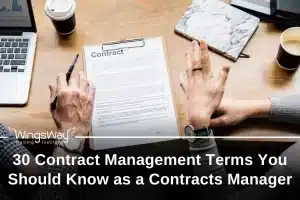
What is Contract Management?
Imagine you’re a procurement manager at a thriving organisation. You’ve just finalised a deal with a supplier for a big project. The terms seem clear, the pricing is competitive, and the timeline is set. But as the project progresses, issues arise—missed deadlines, unclear obligations, and disputes over deliverables. Sound familiar?
This scenario is all too common in the business world, where poorly managed contracts can lead to lost revenue, damaged relationships, and sometimes even legal risks. This is where contract management comes in—a structured approach to creating, executing, and optimising agreements to ensure the successful completion of projects at every stage.
With an effective contract management process, these challenges can be mitigated. You can be assured of clarity, compliance, and collaboration from the very start. This blog post will uncover what contract management entails, what are the various steps, its best practices, and how it can transform your business operations.
Definition of Contract Management
Contract management refers to the process of systematically negotiating, building, executing, updating, analysing, and renewing contracts in a way that ensures that both parties understand and fulfil their obligations. It encompasses every stage of a contract’s lifecycle, from initial request to final renewal or termination.
Contract management is the process in which the contract manager must carefully take care of all the steps of building a legally binding contract between two or more parties that clarifies the demands and responsibilities of each party involved.
Why is Contract Management Important?
The World Commerce and Contracting estimated that between 60 to 80% of all business-to-business transactions are governed by a contract of some sort. Fortune 1000 companies revealed that they manage approximately 20,000 to 40,000 active contracts at one time.
Effective contract management is important because it ensures that agreements are clear, obligations are met, and disputes are minimised. This helps organisations:
- Avoid any misunderstanding regarding the project scope.
- Streamline operations of a project.
- Ensure compliance with legal and regulatory requirements.
- Foster trust and transparency in business relationships.
- Identify opportunities for renewal and optimisation.
If you’re a contractor, business manager, lawyer, finance manager, contract manager, or in HR or executive teams, it is essential you know how to draft, read, and implement contracts.
With specialised contract management training courses, professionals can gain the skills needed to handle complex agreements efficiently. More on that later.
Steps of Contract Management
Since a contract is such an important document, it must be prepared thoroughly and with precision. If done right, your organisation can benefit from proper contract management. Here are the steps to build and manage contracts in a business setting:
#1. Request
This initial phase involves identifying the need for a contract, whether for procurement, partnerships, or any other business purposes. At this stage, you acknowledge the need and the reason for a contract and the parties that should be involved in this. Organisations often rely on contract management software to streamline the request process.
#2. Preparation and Draft
Drafting involves outlining the terms and conditions that align with both parties’ interests. Here, you understand and pen down the reason(s), requirements, terms and gather relevant information about the same. Proper training, such as contract management courses online, equips professionals to craft clear and legally sound agreements.
#3. Negotiation
During this phase, parties discuss the terms of the contract to reach a mutually beneficial agreement. It could be about the time frame of a project, cost, resources needed, tasks or action required from either party—all this is negotiated and agreed upon at this stage. Strong negotiation skills are essential, which can be honed through contract management certification programs.
#4. Approval and Signing
After finalising the terms, the contract is drafted, and a copy of it is sent for review and approval to all the parties involved. If they approve, they must sign and send the signed copy back. This step often involves stakeholders from multiple departments —be it leadership teams, finance, accounting, HR, legal, project manager, etc.
#5. Execution and Obligation
Execution marks the active phase of contract management, where all parties fulfill their contractual duties. Monitoring and tracking tools, often part of contract management software, are crucial here.
#6. Renewal
When a contract is near expiration, you must evaluate the project to see if there’s scope for renewal or termination. Organisations should assess performance metrics to decide the next steps.
#7. Storage and Compliance
This is an important step that many miss—storage of contracts. Proper storage ensures that contracts are accessible for review, audits, and compliance. If not stored properly, you stand the chance of losing a critical legal document, which may cost you additional resources to make again and hamper relationships with other parties.
Digital tools are a game-changer in quickly accessing any contract, maintaining transparency, and ensuring adherence to regulations.
Strategies for Effective Contract Management
There are a few strategies you can use to maintain and manage contracts with ease:
- Use advanced contract management software to automate routine tasks.
- Invest in procurement and contract management courses to build internal expertise.
- Regularly review contracts for optimisation and compliance.
- Maintain clear communication between stakeholders to prevent misunderstandings.
What are Contract Management Best Practices?
Effective contract management is the foundation of strong business relationships, ensuring every agreement delivers clarity, compliance, and measurable value to everyone involved. It goes beyond just managing documents—it’s about creating a framework that mitigates risks, optimises outcomes, and strengthens partnerships.
By following some of its best practices, organisations can transform their contract processes into a strategic advantage, driving efficiency and success across every deal. Here’s how you can elevate your contract management strategy:
- Store all contracts in a centralised, secure location.
- Periodically review contracts to ensure alignment with business goals.
- Enrol teams in contract management courses in Dubai or online programs to enhance their skills.
- Adopt tools that simplify the contract management process and improve efficiency.
- Encourage cross-departmental input during contract creation and execution.
Write Effective Contracts with WingsWay
Learning how to handle contracts effectively is a valuable skill for any professional. It helps streamline official tasks, avoid risks, and make the most of every agreement. Whether you’re based in Dubai or prefer studying online, contract management courses give you the tools to stay ahead of your colleagues and grow in your career.
Take the first step toward mastering contracts—join WingsWay’s Certified International Commercial Contracts Professional course or the Certified International Commercial Contracts Manager course today.
FAQs
What is the meaning of contract management?
Contract management refers to the process of systematically negotiating, building, executing, updating, analysing, and renewing contracts in a way that ensures that both parties understand and fulfil their obligations. This is done to maximise performance and minimise risks.
What is the role of a contract manager?
A contract manager oversees the entire contract management process, ensuring agreements are clear, obligations are met, and disputes are resolved efficiently.
What is the best qualification for a contract manager?
Qualifications such as a procurement and contract management certificate online, certification in international commercial contract management, or a degree in business law, supply chain, or related fields are highly valued.
What is contract management skill?
Contract management skills include negotiation, compliance monitoring, interpersonal communication, stakeholder communication, and proficiency in contract management software.
Tag:Benefits of contract management, contract management, contract management certification, contract management courses, contract management courses in Dubai, contract management courses online, Contract management meaning, contract management process, Contract management software, Contract management strategies, Contracts management training courses, procurement and contract management certificate online, Procurement and contract management courses, what is contract management



